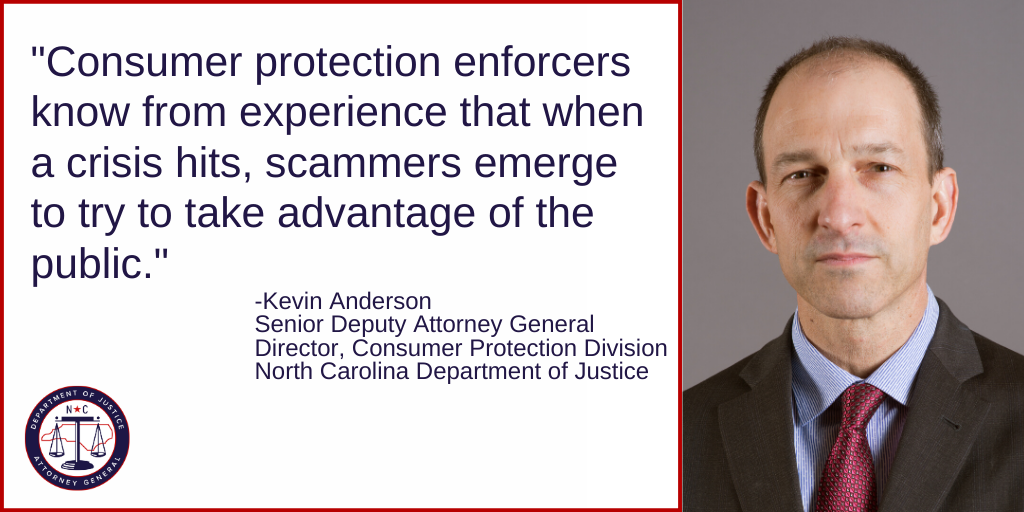
For Immediate Release:
Thursday, July 9, 2020
Contact:
Laura Brewer (919) 716-6484
(RALEIGH) Kevin Anderson, Senior Deputy Attorney General and Director, Consumer Protection Division at the North Carolina Department of Justice, today testified in front of the U.S. House of Representatives Subcommittee on Consumer Protection and Commerce of the Committee on Energy and Commerce during a hearing entitled “Consumers Beware: Increased Risks during the COVID-19 Pandemic.” In his testimony, Mr. Anderson outlines some scams the office has seen and action the Consumer Protection Division has taken.
“Kevin and the other attorneys and staff in my Consumer Protection Division are working hard every day to protect North Carolinians from scams,” said Attorney General Josh Stein. “Sadly, scammers will turn any crisis into an opportunity to steal your money – and the coronavirus pandemic is no exception. I am proud of the work my office is doing to prevent scams and hold scammers accountable.”
From Mr. Anderson’s testimony:
“Consumer protection enforcers know from experience that when a crisis hits, scammers emerge to try to take advantage of the public. Scammers will promote phony miracle cures to consumers wanting to protect their health. They will impersonate government agencies and try to trick consumers to pay fees or provide financial information by claiming that consumers must immediately provide the information or face a dire consequence. And scammers will sometimes engage in price gouging and charge grossly excessive amounts of money for desperately needed goods and services.
“What follows is a sampling of some of the COVID-19 scams that states have seen or heard about to date:
- Miracle COVID-19 cures
- Supplements or herbal remedies that claim to cure or prevent COVID-19
- Suspect “pop-up” COVID-19 testing sites
- COVID-19 antibody tests falsely claiming to be “FDA approved”
- Charging a bogus fee to expeditiously process a consumer’s stimulus check
- Nursing homes trying to confiscate a consumer’s stimulus check by wrongly claiming that they are entitled to the check for Medicaid reasons
- Telemarketers falsely claiming they are from the IRS and trying to trick the consumer into paying a fee or providing personal financial information for stimulus check purposes
- Telemarketers falsely claiming they are from the Federal Trade Commission offering money from a “Global Empowerment Fund” or from the Federal Communications Commission offering COVID-19 relief money
- Robocall scams where the telemarketer falsely claims to be from your insurance company or Medicaid offering free COVID-19 tests
- Door-to-door scams where the scammer falsely claims to be selling cleaning supplies and testing kits as a pretense to enter the consumer’s house and rob them
- Scams that attempt to take advantage of the fact that people are spending more time playing video games during the pandemic and try to steal consumer’s passwords by utilizing pop up questions that trick consumers into providing answers to questions that are commonly used as passwords by other services the consumer uses
- False websites advertising jobs for people to become contact tracers, which try to trick consumers into providing personal or financial info
- Telemarketers impersonating state or local health departments and falsely claiming that the consumer has been in contact with someone that has COVID-19 and that the consumer must pay a fee in connection with the contact tracing process
- Phony phishing emails from the World Health Organization that try to trick consumers into providing personal or financial information
- Email phishing scams where scammers make unfounded promises about ways in which small business owners can quickly get approvals for Emergency Injury Disaster Loan funding from the Small Business Administration (SBA)
- Unemployment scams where overseas scammers use personal information stolen in data breaches and hacks to file for unemployment benefits in someone else’s name
- Puppy scams where scammers trick consumers wanting a new pet during the pandemic into paying upfront money for a non-existent pet
- Individuals hoarding over 17,000 bottles of hand sanitizers and planning to charge high prices for them
- Towing companies that wrongly towed and booted trucks delivering needed goods and services to stores and then charging thousands of dollars above market rates for the trucks to be released
“In North Carolina, for example, we sent a cease and desist letter to a self-proclaimed “witch doctor” promoting a miracle cure for COVID-19 via a billboard, resulting in an end to the billboard advertisement. We also sent such a letter to a chiropractor who briefly claimed via the Internet that a number of studies showed chiropractic treatment could cure COVID-19, and helped stop that activity. We sued a towing company engaging in the type of activity described above, alleged a violation of North Carolina’s price gouging law and obtained a temporary restraining order and preliminary injunction against it. And we have a number of COVID-19 scam and price gouging investigations still under way. Other states are engaging in similar efforts, although we each have to rely on the particular evidence and facts that come to light in our respective states.”
For full text of Mr. Anderson’s testimony, please click here.
More on Attorney General Stein’s work to protect North Carolinians during the COVID-19 pandemic:
- Attorney General Josh Stein Challenges the Trump Administration’s Refusal to Open a COVID-19 Special Enrollment Period on HealthCare.Gov
- Attorney General Josh Stein Today Announces SECU Joins Carolina Relief Plan
- Attorney General Josh Stein Calls on Tech Companies to Keep Contact Tracing Information Secure
- Attorney General Josh Stein Today Announced the Carolina Relief Plan for NCians Facing COVID-19 Related Financial Hardship
- Attorney General Josh Stein Shares Resources for People Facing Addiction During COVID-19
- For a full overview of this work, please visit ncdoj.gov/covid19
###
